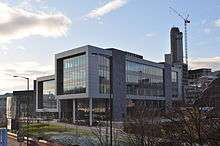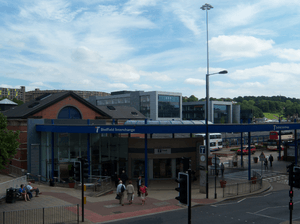Sheffield City Centre
Sheffield City Centre (referred to locally as simply Town) is a district of the City of Sheffield, and is partly covered by the City ward of the City of Sheffield. It includes the area that is within a radius of roughly 0.75 miles (1.2 km) of Sheffield Cathedral, and is encircled by the Inner Ring Road—a circular route started in the late 1960s and completed in 2007. As well as the cathedral, buildings in the city centre include the Grade I listed Town Hall, the City Hall, and the Winter Gardens. Several areas of the city centre have been designated as quarters. It is home to the city's major business, transport, leisure and cultural attractions. The City centre is currently undergoing massive re-generation with every section of the City centre set to be re-developed. Plans and projects include the development of new squares and public spaces, new residential and office buildings including St. Pauls Tower, Velocity Living, and the under-construction Velocity Tower, the Sevenstone and Moor shopping areas, redevelopment of existing buildings such as the Crucible Theatre and better transport and shopping facilities and new cultural attractions such as museums and art galleries.
| Sheffield City Centre | |
|---|---|
 Sheffield City Centre, viewed from Norfolk Park | |
 Sheffield City Centre Location within Sheffield | |
| OS grid reference | SK356873 |
| • London | 144 mi (232 km) SSE |
| Metropolitan borough |
|
| Metropolitan county | |
| Region | |
| Country | England |
| Sovereign state | United Kingdom |
| Post town | SHEFFIELD |
| Postcode district | S1 |
| Dialling code | 0114 |
| Police | South Yorkshire |
| Fire | South Yorkshire |
| Ambulance | Yorkshire |
| UK Parliament | |
In late 2006, the "Connect Sheffield" scheme came into being.[1] As part of this scheme, vehicle signage was improved by dividing the centre into four main areas (separate from the quarters) using electronic messaging panels with information about congestion and available parking, information about transport and visitor attractions, tens of pillars [2] were erected in key places, varying from narrower pillars for bus and tram stops and the station, to much broader pillars outside key attractions, each showing information on the immediate surroundings, a map and (in some cases) a clock, all junctions on the Inner Ring Road have been numbered and marked with a strong landmark feature, a new map of the city centre will be produced in print and online, travel information panels in bus interchanges have been made clearer and the yournextbus system was rolled out into LAD boards telling passengers when the next bus is due at their stop using GPS technology.
Zones/Quarters
Following the implementation of the 1994 City Centre Strategy eleven 'quarters' were defined within the city centre.[3] Following on from this, during the 2004 redevelopment of the city centre four 'districts' were identified within the city centre, primarily for aiding traffic.[4]
Districts: Centre, Riverside, Sheaf Valley & West End
Quarters: Kelham Island Quarter, Riverside, Castlegate, Sheaf Valley, Cultural Industries Quarter, The Moor Quarter, Devonshire Quarter, St Georges Quarter, St Vincent Quarter, Cathedral Quarter and Heart of the City.
The main Districts are as follows:
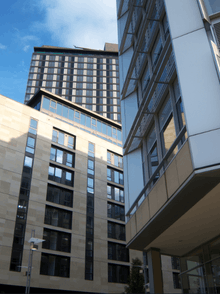
Centre
The central district of Sheffield is home to the Town Hall and the major shopping areas of Fargate, Orchard Square and Commercial Street. The city's famous 1 o' clock time signal is located where Barker's Pool meets Leopold Street on the side of H.L. Brown the jewellers and sounds a daily siren to tell the time. The Heart of the City area, as its name suggests, lies at the centre of this zone and encompasses the Town Hall and Peace Gardens, a major focal point for people in the city. Adjacent to this is St Paul's Place, in centre of Sheffield, a new mixed use development lying between the Town Hall and Arundel Gate, one of the major roads running through the city centre. Sheffield's largest building, St Pauls Tower, is situated on the edge of St Paul's place, close to both the Town Hall and Sheffield Station. At the opposite end of Fargate to the Town Hall is the Cathedral Quarter. Here there are numerous law firms and employment agencies, as well as numerous shops and the city centre hub for the Sheffield Supertram. The city centre has several cinemas including, Odeon Sheffield located on Arundel Gate, 'The Light' cinema on The Moor and the independent 'Showroom' cinema based near Sheaf Square.
Also within the central zone is The Moor. Originally Sheffield's primary shopping area, it became run down and lost some of its prominence due to uncertainty surrounding the adjacent and now axed Sevenstone retail development. However, the opening of a new purpose built indoor market hall in November 2013 and the ongoing Sheffield Moor Development plan footfall has increased and there has been a stimulation of businesses reopening and moving into the area. The Scottish Widows group own the majority of The Moor and are funding its staged redevelopment,[5] including the significant public realm improvements to the street scene that were completed during 2013.[6]
Riverside
The Riverside District, lying along the banks of the River Don, was traditionally an industrial zone including the Kelham Island Quarter.[7] In the 21st century it has become dominated by new office developments and apartment complexes. The Riverside Exchange and West Bar developments are a significant part of this change and have seen the area transformed dramatically. Also in this area is the St Vincent Quarter which lies on the opposite bank of the River Don to the Riverside Exchange area.
Sheaf Valley
The Sheaf Valley Area, surrounding the River Sheaf, is dominated by Sheaf Square/Sheffield Station and the Cultural Industries Quarter (CIQ). Sheaf Square, which has been completely redeveloped in recent years, now serves as gateway to the city centre.[8] Sheffield Station, serving as the entrance to this gateway has also been redeveloped whilst maintaining its grand Victorian façade.[8] The CIQ is home to several bars and clubs (such as the Leadmill) and the Showroom Cinema, which books a more diverse selection of films than mainstream cinemas.[9] Red Tape studies is also in the area. This area, in contrast to the other parts of the city centre, has seen less redevelopment in recent years as it lies outside the normal shopping areas and those frequented by tourists/visitors to the city.
West End
The West End District, lying to the West of the Central zone, is the city's social and academic hub. West Street, the main thoroughfare in this area, is home to Sheffield's largest concentration of bars, clubs and restaurants and is heavily used by young adults, students in particular. Many university buildings are in this area, including many parts of the Sheffield Teaching Hospitals (although they mostly lie beyond the Inner Ring Road and thus do not constitute part of the City Centre). The Supertram also runs through this district, connecting it to the central zone and several other areas of the city. The Devonshire Quarter, on the southside of West Street, is a social and commercial hub, again especially for the young. It has seen a great deal of investment.[10] The St Georges Quarter, right in the centre of the West End zone, is relatively small and focused upon the end of West Street as it meets the Inner Ring Road at Sheffield University Officer Training Corps home - Somme Barracks, main entrance is on Gell Street.
New and future developments
In recent years there have been numerous new developments in Sheffield City Centre seeing a large number of new additions to the skyline. Most of this work has been carried out under the guidance of the 'City Centre Masterplan 2008' and examples of its progress can be seen Tudor Square, Riverside, Castlegate and the Sheffield Digital Campus.[11]
St Paul's place is one of the most notable developments and features Sheffield's tallest tower. Riverside exchange and the West Bar combine to make a large business district on the north side of the city centre and are also home to legal and governmental offices.
Sheaf Square and the Sheffield Station have also been heavily redeveloped and are due to see extras improvements in the next few years. In the West End area the University of Sheffield has invested in a number of new facilities and student accommodation and Sheffield Hallam University has greatly improved the area outside its main campus on Arundel Gate also.
Sheffield's shopping areas are in the process of being redeveloped and when finished will attract business from further afield than ever before. The Moor, once Sheffield's busiest shopping street, is being gradually redeveloped by private owner Scottish Widows and a new £18m indoor market was opened in 2013, relocating traders from the ageing Castle Market in the Castle Gate Quarter of the city.
The Sevenstone/New Retail Quarter development was due to redevelop a substantial portion of the city centre. It had been on hold since 2008 due to the recession and was cancelled in its current form all together in July 2013 when Sheffield City Council decided to relieve developer Hammerson of their development rights.[12] Sheffield City Council announced in late 2013 that they will proceed with their own development scheme to replace the axed Sevenstone project.[13]
Events
Sheffield City Centre is host to a multitude of events, ranging from small farmers markets to international sporting events. Sheffield International Venues and Sheffield Theatres maintain the larger venues whilst several others are managed privately.
Sports
Ponds Forge International Sports Centre, on the edge of the city centre, is host to numerous national and international sporting events, notably swimming and Basketball.[14]
The Crucible Theatre, in Tudor Square, is host to the World Snooker Championships which have been held there since 1977.[15]
Theatre
Sheffield is home to the greatest concentration of theatres in the UK outside London. These include the Crucible, Lyceum, Montogomery and Studio theatres.
Live Events
The city centre is home to numerous venues which attract many well-known musicians, comedians, theatre groups and so on. Examples include the City Hall, O2 Academy, Plug, and the Lyceum and Crucible theatres.
Sheffield city centre is host to its own music festival, Tramlines. This event, entry to which is free, was first organised in 2009 and takes place at several venues across Sheffield, notably in the city centre.
Markets
Sheffield City Centre plays host to a number of themed markets throughout the year with most taking place on Fargate, in the Peace Gardens or at Barkers Pool.[16] Themes include Continental (European Foods, crafts etc.), German (Christmas market) Italian, Tunisian and occasionally global themed markets take place. There are also farmers and crafts markets taking place throughout the year.[16]
Attractions
 Millennium Square and the Winter Gardens
Millennium Square and the Winter Gardens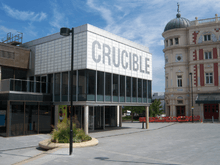 The Crucible and Lyceum theatres in Tudor Square
The Crucible and Lyceum theatres in Tudor Square- Millennium Galleries
Transport
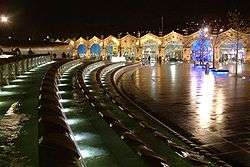
Rail
Sheffield railway station lies on the edge of the city centre and is within easy walking distance of the main shopping areas. This station lies at the northern end of the Midland Main Line which begins at London St Pancras, thus affording Sheffield a direct connection to the capital and also Europe, via the Eurostar.[17] Direct connections to other major UK cities are also available. Sheffield station is connected to the central zone of the city centre by Sheaf Square and Howard street which leads to Arundel Gate at the Heart of the City.
Supertram
Sheffield possesses its own tram system known as the Sheffield Supertram. It operates on three routes, all of which run through the city centre, the Cathedral Square stop forming a focal point for operations.
Coaches
National Express coaches serve Sheffield city centre direct through the Sheffield Interchange. The 560/564 service connects directly to London Victoria Coach Station (only occasionally stopping at Chesterfield and Milton Keynes en route).[18] Numerous other services connect Sheffield to destinations across the UK and all of them depart/arrive at Sheffield Interchange.
Buses
Sheffield city centre is home to the Sheffield Interchange. In recent years it has lost importance as the South Yorkshire Passenger Transport Executive have constructed several ‘mini-interchanges’ around the city centre to accommodate shopping and other activities the areas for which are poorly accommodated by the interchange.[19] However, many services depart from/arrive here and it is within short walking distance of Sheffield station. The ‘FreeBee’, a Zero-fare city centre bus service operates out of the interchange and serves some of the key shopping areas in the city centre.[20]
Road
In a bid to improve the city centre, several major thoroughfares which were once open to the public have in recent decades been pedestrianised. As a consequence there are fewer options for car drivers in the city centre. The city centre is encircled by the Inner Ring Road which connects to the Sheffield Parkway at Park Square and this in turn connects to the M1 motorway.
Leisure and Business
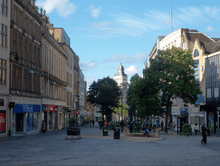
Fargate
Fargate is a major pedestrianised street in the heart of the city with its southern end lying outside the town hall. Also located at this point was the Wheel of Sheffield which, during 2009 and 2010, was a landmark on the Sheffield skyline. Several well-known High Street stores have a presence in this area or the connecting areas of Orchard Square or Commercial Street.
The Moor
The Moor has historically been one of Sheffield's most popular shopping zones. Like Fargate, it is a pedestrianised area and plays host to markets (although on a more permanent basis than Fargate). The Moor had become run down in recent years and is in the midst of redevelopment, with new urban landscaping already in place and a new, large £18m indoor market which opened in November 2013.[21] A large site adjacent to the existing Debenhams department store is currently being cleared for a new retail and leisure development. It will include a nine screen cinema, a flagship Primark store, four additional shops, and seven restaurants, two of which have been signed to Bella Italia and Gourmet Burger Kitchen.[22]
New Retail Quarter/Seventone
Originally due for completion in the early 2010s, NRQ/Sevenstone was to become be a major shopping/living area adding 250 new shops to the city centre. As of 2008 the project remained on hold due to the economic downturn and Sheffield City Council finally dropped developer Hammerson in July 2013 after no firm agreement for recommencement of the project could be reached.[12] Sheffield City Council has announced that it will eventually take a new scheme forward using a combination of private and public funds. No firm time-scales for the new project have been formally released as of April 2014, although plans were expected to be released to the public in spring 2014.[13]
Riverside
The Riverside Exchange is a new, large business district in the north of the city centre and is home to organisations such as Irwin Mitchell and the UK Border Agency.
West Street/Devonshire Quarter
The West End district of the city centre is home to many independent shops, bars and coffee shops - particularly catering for the large student population in the area. Devonshire Green, a small landscaped district park is host to the main stage of the annual Sheffield Tramlines Festival as well as outdoor cinema screenings throughout the summer.
Street names
Several street names in the city centre are associated with the Duke of Norfolk (Arundel Gate, Norfolk Street, Surrey Street, Fitzalan Square) and the Duke of Devonshire (Cavendish Street, Devonshire Street).
See also
| Wikimedia Commons has media related to Sheffield City Centre. |
- Districts of Sheffield
- Sheffield city region
- Listed buildings in Sheffield City Centre
References
- "Sheffield City Council – Connect Sheffield". Archived from the original on 13 February 2007.
- Archived 23 May 2006 at the Wayback Machine
- Sheffield City Council Archived 6 July 2010 at the Wayback Machine. Sccplugins.sheffield.gov.uk. Retrieved on 30 September 2011.
- Sheffield City Council Archived 28 May 2010 at the Wayback Machine. Sccplugins.sheffield.gov.uk. Retrieved on 30 September 2011.
- "Moor Assets". Moorsheffield.com. Archived from the original on 15 April 2014. Retrieved 14 April 2014.
- "Project to develop The Moor in Sheffield signed off". BBC News. BBC. 7 March 2012. Retrieved 14 April 2014.
- UK Museums – Kelham Island Museum in Sheffield. Gouk.about.com (17 July 2011). Retrieved on 30 September 2011.
- Archived 4 July 2010 at the Wayback Machine
- Showroom Home – Showroom & Workstation – Sheffield. Showroomworkstation.org.uk. Retrieved on 30 September 2011.
- [ARCHIVED CONTENT] The Devonshire Quarter, Sheffield | Case studies. CABE. Retrieved on 30 September 2011.
- City centre masterplan | Develop in Sheffield. Creative Sheffield. Retrieved on 30 September 2011.
- "Sevenstone developer dropped by Sheffield council". BBC News. BBC. 29 July 2013. Retrieved 14 April 2014.
- "Sheffield plans new retail scheme after Sevenstone scrapped". BBC News. BBC. 10 October 2013. Retrieved 14 April 2014.
- Ponds Forge | Sport | Sheffield Hallam University. Shu.ac.uk. Retrieved on 30 September 2011.
- World Snooker Championship Archived 16 July 2011 at the Wayback Machine. Sheffield Theatres. Retrieved on 30 September 2011.
- Sheffield City Council – Farmers' and Specialist Markets Archived 15 July 2010 at the Wayback Machine. Sheffield.gov.uk. Retrieved on 30 September 2011.
- from Sheffield – Trains to Europe. Eurostar. Retrieved on 30 September 2011.
- London to/from Sheffield. National Express Coach Timetable. nationalexpress.com
- Interchanges. Travelsouthyorkshire.com. Retrieved on 30 September 2011.
- FreeBee buses. Travelsouthyorkshire.com. Retrieved on 30 September 2011.
- "Sheffield's Moor Market opens for business". BBC News. BBC. 25 November 2013. Retrieved 14 April 2014.
- "Sheffield Moor sees The Light". The Star. 5 February 2014. Retrieved 14 April 2014.
